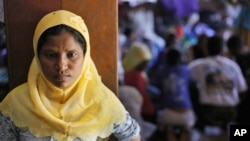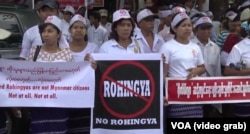Rights groups are calling on the Association of South East Asian Nations (ASEAN) to make greater progress in settling about 7,000 Muslim Myanmar refugees a year after they were rescued after being abandoned at sea by traffickers.
The refugees are mostly from the Rohingya population of Myanmar's western Arakine state and were saved after a crackdown by Thai authorities.
Crackdown on traffickers a year ago
Earlier, camps used by smugglers were uncovered in southern Thailand and dozens of bodies were found in shallow graves.
Over 100 people were arrested with links to the trafficking gangs, including some Thai officials.
A May 2015 emergency meeting of 17 countries including the United States, Japan, Switzerland and Australia and key United Nations humanitarian agencies, had pressed for action to resolve the issue of irregular migration.
Thousands of Rohingya remain in camps
But, a year after they were abandoned at sea, thousands of Rohingya remain in detention camps.
In Malaysia alone, according to rights groups, there are almost 2,500 being held, while others are detained in shelters in Indonesia and Thailand.
Aung San Suu Kyi aware of the problem
Myanmar's state counselor, Aung San Suu Kyi, is making a visit to Thailand this week and has called on the international community to give Myanmar "enough space" to address the problem of the Rohingya.
Thai civil society groups say they are hoping to submit recommendations to Suu Kyi, who is also Myanmar's foreign minister, including the issue of citizenship for the Rohingya who have fled Myanmar.
Siriprapha Petcharamesree, from Mahidol University's Institute of Human Resources, says the issues of detention and statelessness, faced by the Rohingya, remain.
"The problem is still there. It remains exactly the same. Those people who are detained in detention centers are still there. Rohingya in different places they are still taking risks to be arrested and again put into detention or deportation. The high risk is still there. Their rights are not protected. So for me this is a failure," Siriprapha told VOA.
UN to address the issue later this year
Regional meetings have been held on the problem and there is a United Nations Summit on refugee and migrant movements at the U.N. General Assembly in September this year.
But for Rohingya in the detention centers, there is a growing sense of desperation. On May 23 in Thailand, 21 Rohingya fled a center in Southern Thailand that led to one person being shot dead by Thai police.
Angkhana Neelapaichit, a member of the National Human Rights Commission, says the Thai Government's response has fallen short of steps indicated after the emergency meeting in May last year.
"The Thai government still has no specific policy for this group of people. They are migrants and they are detained and cannot go out to work, denied access to education and cannot access public health services so this is a problem," Angkhana said.
A recent report by Australia's ABC broadcaster, found the Rohingya holding camps in western Rakhine State poorly managed, with substandard structures such as latrines, damaged by a recent storm, forcing men and women to defecate in nearby open fields.
Financial help is on the way
ASEAN states have agreed to set up a special fund to support migrants and refugees, a move welcomed by rights groups.
Matthew Smith, executive director of the rights group, Fortify Rights, says there has also been a decline in numbers of Rohingya fleeing Myanmar but regional governments need to address the broader issues.
"The problem now is the response from regional governments has not prioritized the protection of survivors. So people who survived human trafficking last year are still being held in detention," Smith told VOA.
ASEAN, he says, needs to do more on policies on irregular migration in the region often linked to transnational criminal syndicates.
"This is a transnational issue this is an international issue this is a regional issue and really no single country can do it alone in terms of tackling this," Smith said.







